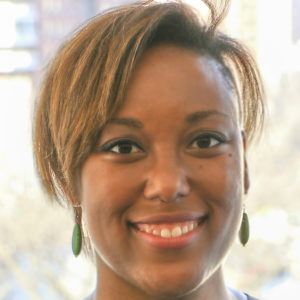 Courtney Cogburn, an assistant professor at Columbia University’s School of Social Work, has developed a virtual reality simulation that demonstrates the impact of racism on African Americans today.
Courtney Cogburn, an assistant professor at Columbia University’s School of Social Work, has developed a virtual reality simulation that demonstrates the impact of racism on African Americans today.
Dr. Cogburn had discovered that many of her colleagues and friends, even those who were avid supporters of social justice, were out of touch with how racism effects African Americans in today’s society. So she decided to find a way for others to walk in the shoes of someone living that experience.
“We wanted people to have a visceral sense of what this feels like,” she said. “It’s more likely to trigger empathy, and to help you understand the scope and nature of racism and racial inequality in our society.”
Dr. Cogburn partnered with Dr. Jeremy Bailenson, a cognitive psychologist and director of Stanford University’s Virtual Human Interaction Lab. Together, they created a 12-minute virtual reality program called 1000 Cut Journey. The simulation immerses the viewer in the life of a fictional African American man, Michael Sterling, as he encounters racism at different points in his life. The program depicts Sterling as a child being disciplined by a White teacher while his fellow White students are not punished for the same behavior, then as an adolescent in a police scenario, and finally as an adult at an unsuccessful job interview.
“There’s a tendency among White liberals to want to believe that racism is about ‘those people over there, we’re not talking about me,’ or ‘I am not culpable in these systems and processes and dynamics that we’re talking about,” Dr. Cogburn said. “In order for us to more meaningfully and collectively engage issues of racial equality, we all need to be on the same page. And if White liberals think of themselves as removed from these systems of racism, then we aren’t on the same page.”
Dr. Cogburn is a graduate of the University of Virginia where she majored in psychology. She holds a master’s degree in interpersonal practice with children, youth, and families in society and a Ph.D. in education and psychology both from the University of Michigan.

